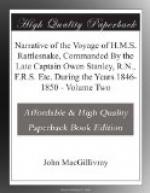Head : na-guilo : ne-maiat : -.
Eye : ni-gecoge : na-toele : ni-cote.
Ear : na-pagate : — : -.
Nose : ni-onige : — : -.
Tongue : no-gueligi : — : -.
Hair : na-modi : ne-etiguic : na-ccuta.
Mand : ni-baagadi : na-pakeni : na-poguena.
Foot : no-gonagi : — : -.
COLUMN 1: ENGLISH.
COLUMN 2: MOXA (1).*
COLUMN 3: MOXA (2).
COLUMN 4: MOXA (3).
(Footnote. These are three different dialects.)
Head : nu-ciuti : nu-chuti : nu-chiuti
Eye : nu-chi : — : nu-ki
Ear : nu-cioca : — : -.
Nose : nu-siri : nu-siri : -.
Tongue : nu-nene : nu-nene : nu-nene.
Hand : nu-bore : nu-boupe : nu-bore.
Foot : ni-bope : — : ni-bope.
Now in these, and in numerous other American tongues, the prefix is the possessive pronoun; in other words, there is a great number of American languages where the capacity for abstracting the thing possessed from the possessor is so slight as to make it almost impossible to disconnect the noun from its pronoun. I believe, then, the affixes in question have a possessive power; and am not aware that possessive adjuncts thus incorporated have been recognised in any of the languages for these parts; indeed, they are generally considered as American characteristics.
How far does their presence extend? In the New Caledonian vocabulary of La Billardiere we find it. The names of the parts of the body all take an affix, which no other class of words does. This is gha, guai, or ghai, or other similar combination of g with a vowel. In Van Diemen’s Land, an important locality, we find the following series of words, which are submitted to the judgment of the reader.
COLUMN 1: ENGLISH.
COLUMN 2: WESTERN TASMANIAN.
Foot : lula.
Leg : peea = piya = posteriors, Brumer I.
Thigh : tula = turi = knee, Brumer I.
Belly : cawara-ny.
Neck : denia.
Ears : lewli-na.
Nose : me-na.
Eyes : pollatoola = matara-pulupulura = eyelashes,
Brierly I.
Hair : pareata.
Hair : palani-na.
Face : manrable.
Mouth : ca-nia.
Teeth : yannalople = yinge-da, Brierly I.
Tongue : tulla-na.
Arm : alree.
Fist : reannema-na.
Head : pulbea-ny.
Here the termination na appears elsewhere, as in mema-na = fight, nabagee-na = sun; but by no means so frequently, nor yet with such an approach to regularity.
COLUMN 1: ENGLISH.
COLUMN 2: CIRCULAR HEAD.
Hair : parba.
Hand : rabal-ga.
Foot : rabuc-ka.
Head : ewuc-ka.
Eyc : mameric-ca.
Nose : rowari-ga.
Tongue : mamana = mimena, Brumer I.
Teeth : cawna.
Ear : cowanrig-ga.
Here, however, it must not be concealed that the termination ka, or ga, occurs in other words, such as tenal-ga = laugh, tar-ga = cry, teiri-ga = walk, lamuni-ka = see. These, however, are verbs; and it is possible (indeed probable) that the k or g is the same as in the preceding substantives, just as the m in su-m, and ei-mi (Greek) is the m in meus, me, and eme (Greek). Still, this will not apply throughout; e.g. the words like lalli-ga = kangaroo, para-ka = flower, and others.




